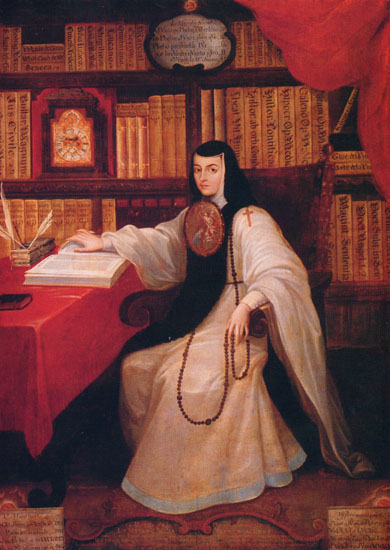Imagination, Intellect, and Good Works
Rebecca Spears
 “For the mouth speaks out of that which fills the heart”
—Matthew 12.34
“For the mouth speaks out of that which fills the heart”
—Matthew 12.34
Suppose at a very young age, you could read and write at an advanced level, and almost without effort. Imagine having a desire for knowledge that seems to take charge of you. You read everything you can get your hands on—sometimes your reading is directed and purposeful; other times it is rangy and anxious. What if you could turn on your imagination with hardly a conscious effort and turn words into fine imagery and figurative language?
This is Sor Juana Ines de la Cruz (1651 – 1695), a child prodigy, who as a young adult, garnered the attention and support of Mexico’s leaders and courtly society. In her life, she became widely known throughout Mexico and in Europe as the Tenth Muse. Yet she lived in an era when women’s roles were tightly circumscribed and society was highly regimented. An unlikely celebrity, she was born an “illegitimate” child and raised by her mother, though she enjoyed the refuge of her grandfather’s hacienda during her childhood. In her grandfather’s library, she read hungrily. By several accounts, she was also a religiously devoted child. As she matured, she began to speak of her intellect and imagination as God’s gift.
At age 12, when her grandfather died, the girl was sent to serve in the viceroy’s court in Mexico City. She had expressed to her mother the wish to attend university disguised as a male, but she was forbidden from doing so. In the royal court, though, the viceroy’s wife helped her continue her education and writing. By all accounts, Juana Ines grew into a stunning beauty, catching the attention of several suitors. Yet she defied all expectations when she refused more than one marriage proposal and entered the convent in 1669. She did so, she said, so that her studies and writing might continue.
In the convent, Sor Juana enjoyed her own apartment and the protection not only of the Church, but also the viceroy’s court—for a time. When her most ardent supporters left “New Spain” for Spain, the Archbishop of Mexico and other church officials sought to forbid her from reading or writing anything that was not religious. Ultimately, Sor Juana bowed to the Archbishop’s pressure. However, her body of work, which includes drama, poetry, rhetoric, religious texts, and carols, is still the inspiration for many writers today.
Sor Juana came to my attention, during my days as an editor, when I was asked to copy-edit Willis Barnstone’s Six Masters of the Spanish Sonnet. This volume introduced me not only to Sor Juana Ines de la Cruz, but also Antonio Machado, Federico Garcia Lorca, Jose Luis Borges, and others. The world of poetry opened up to me when I read these translations. The only woman among these masters is Sor Juana. I took note of that.
It is a wonder that she is recognized at all. That she persisted in her writing for so long is because she was determined to use the talents that God gave her. She once wrote, “What garland can human wisdom expect when it sees what divine wisdom received?” Jesus, she reminds, brought divine wisdom to people, and yet the people executed him. Sor Juana knew that her studies and writing lay outside society’s role for women. She was prepared to face the consequences of her work. In that way, she serves as an inspiration to many, including myself. She did the good works she believed she was meant to do.